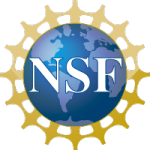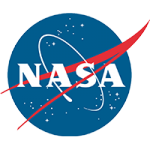The 2017 OCB Summer Science Workshop was held June 26-29, 2017 at the Woods Hole Oceanographic Institution in Woods Hole, Massachusetts. View the social media activity for this meeting at #OCB2017!
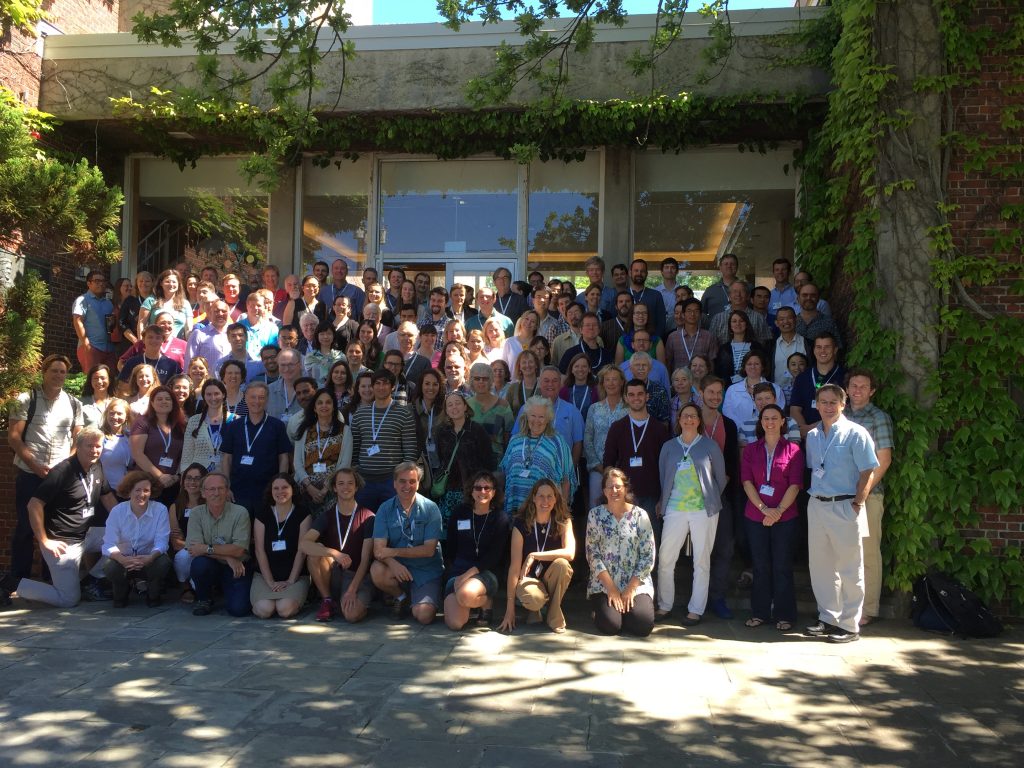
1. Plenary Sessions
Monday, June 26, 2017
Carbon fluxes in coastal wetlands
Organizers: Chris Osburn (NCSU), Z. Aleck Wang (WHOI), Maria Tzortziou (CUNY), Kevin Kroeger (USGS)
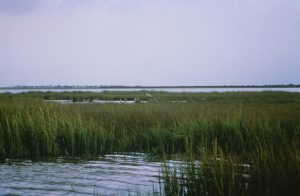
Coastal wetlands, photo by the U.S. Fish and Wildlife Service
Coastal wetlands (e.g., salt marshes, mangroves, tidal freshwater wetlands, and sea grass beds) exhibit high rates of carbon assimilation, storage and fluxes. These ecosystems provide a wide range of services, including carbon sequestration, coastal protection, habitat provision and nutrient and sediment regulation. Recent studies demonstrate that coastal wetlands play important roles in global and regional carbon cycles and exert significant influences on the biogeochemistry of the coastal ocean. Large uncertainties remain, however, about coastal wetland carbon biogeochemistry and fluxes due to their highly heterogeneous and dynamic nature, as well as their susceptibility to human pressures and climate change. This session will highlight new state-of-the-art observational, analytical, modeling, and large-scale assessment approaches being used to quantify and constrain carbon fluxes in coastal wetland systems, including exchange fluxes at critical boundaries such as air-water, sediment-water, and wetland-ocean interfaces.
This session kicked off with presentations by invited speakers Ray Najjar (Penn State) and Lisamarie Windham-Myers (USGS). The remainder of the session included a combination of lightning presentations by OCB workshop participants and open group discussion on the topics of internal cycling, lateral fluxes and exchanges, vertical fluxes and exchanges, and regional-scale modeling efforts.
Tuesday, June 27, 2017
Ecological and biogeochemical impacts of natural climate perturbation
Organizer: Andrew Barton (SIO)
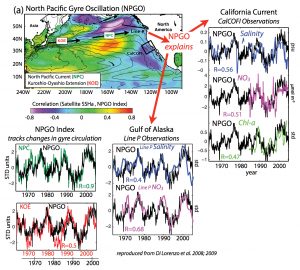
Di Lorenzo et al. (2013) Oceanography
Projected anthropogenic climate change over the coming century is likely to impact marine ecosystems and biogeochemical cycles in marked and various ways. In addition to this anticipated change, natural modes of climate variability have been found in the past to influence marine ecosystems and biogeochemical cycles on human-relevant timescales. In some cases, the magnitude of natural perturbations and potential consequences may exceed the anticipated effects from climate warming over the coming century. Speakers in this session will examine the ecological and biogeochemical consequences of natural modes of climate variability, including El Niño-Southern Oscillation, the Pacific Decadal Oscillation, the North Atlantic Oscillation, and others. Invited talks will discuss links between climate variability and changes in a broad range of organisms and trophic levels, from plankton to top-level predators, and connect these ecological changes to biogeochemical variability.
Speakers for this session included Thomas Frölicher (ETH Zurich), Andrew Pershing (GMRI), Julie Keister (UW), and Phoebe Woodward-Jefcoats (NOAA).
Mesoscale and submesoscale physical-biological-biogeochemical interactions
Organizers: Andrea Fassbender (MBARI) and Dennis McGillicuddy (WHOI)
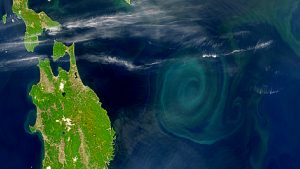
An eddy off Japan in Kuroshio-Oyashio Extension region, photo by NASA.
This session will address mesoscale and submesoscale dynamics and the physical-biological-biogeochemical interactions that occur over the associated space and time scales. Speakers will present research on the role of physical circulation features in the distributions of chemical constituents and organisms in coastal and open ocean regions. Both observational and modeling perspectives will be included in the discussion of how physical processes influence the transport of material and the biological pump.
Speakers for this session included Peter Gaube (APL), Melissa Omand (URI), Peter Franks (SIO), Annie Bourbonnais (WHOI), and Sophie Clayton (UW).
Wednesday, June 28, 2017
Stoichiometry and higher trophic levels
Organizers: Debbie Steinberg (VIMS) and Mike Roman (UMCES)
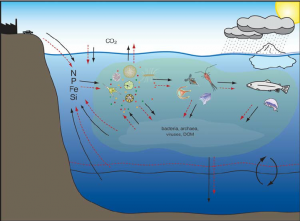
Finkel et al. (2010), Journal of Plankton Research
Ecological stoichiometry considers how the balance of C,N,P, and other chemical elements affects, and is affected by, organisms and their interactions. The majority of research on this subject in marine ecosystems has focused on primary producers; in this session we highlight the role of consumers in carbon and nutrient cycling. The affects of food quality or diet (e.g., mixotrophy) on elemental balance, the importance of stoichiometry for the biological pump, and effects on fisheries production will be addressed using examples from both marine and freshwater ecosystems.
Speakers for this session included Bob Sterner (Large Lakes Observatory, Univ. Minnesota, Duluth), Tom Anderson (NOC), Carla Atkinson (Univ. Alabama), Sigrún Jonasdottir (DTU), and Patricia Glibert (UMCES).
Thursday, June 29, 2017
Our autonomous future
Organizers: David Siegel (UCSB) and Jessica Cross (NOAA/PMEL)
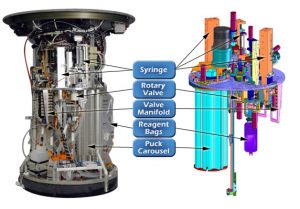
Photo Credit: MBARI
Ocean robots such as autonomous underwater vehicles (AUVs) and remotely operated vehicles (ROVs) have been a game changer for 21st century oceanography, greatly expanding our capacity in space and time to measure and explore the ocean. This session will highlight existing and visionary technologies that hold great promise for advancing OCB science, including in situ manipulation and exploration of the mesopelagic, remote molecular probes to detect microorganisms in real-time, autonomous robotic networks to quantify biogeochemical fluxes and other key ecosystem parameters, and underwater imaging technology to assess particle size spectra.
Speakers for this session included Oscar Schofield (Rutgers Univ.), Craig Lee (APL/UW), Jessica Cross (NOAA/PMEL), Dana Yoerger (WHOI), Kakani Katija (MBARI), Alexander Bochdansky (ODU), and Francisco Chavez (MBARI).
2. Agenda with Talks and Webcast Footage
2017 OCB Summer Workshop Agenda (PDF)
| Monday, June 26, 2017 | |
| 7:30-8:30 | Breakfast (Redfield tent) |
| 8:30 | Welcome (Bethany Jenkins, URI, OCB SSC vice-chair) Slides Video |
| 8:40 | Introduction and opening remarks (Heather Benway, OCB Project Office) Slides Video 1 (begins 3:00) Video 2 |
| 8:55 | Getting to know the Biological and Chemical Oceanography Data Management Office (BCO-DMO) at OCB 2017 (Danie Kinkade, BCO-DMO) Slides Video |
| Plenary Session 1. Carbon fluxes in coastal wetlands: What is state-of-the-art? – Chairs: Chris Osburn (NCSU), Z. Aleck Wang (WHOI), Maria Tzortziou (CUNY), Kevin Kroeger (USGS) YouTube Session 1 Playlist | |
| 9:00 | Session introduction and overview (Chris Osburn, NCSU) Slides Video |
| 9:15 | Carbon budget of eastern North American tidal wetlands and estuaries (Ray Najjar, PSU) Slides Video |
| 9:45 | Coastal wetland carbon accounting: Using U.S. syntheses to build up the baseline (Lisamarie Windham-Myers, USGS) Slides Video |
| 10:15 | Open group discussion on plenary talks Video |
| 10:30 | Break |
| Topic 1: Lateral fluxes and exchanges – DIC, DOC, and POC and their effects on coastal carbon chemistry and budgets (Moderator: Chris Osburn, NCSU) | |
| 11:00 | Lightning talks part 1
|
| 11:30 | Panel discussion on lateral fluxes and exchanges part 1 Video |
| 11:45 | Lightning talks part 2
|
| 12:15 | Panel discussion on lateral fluxes and exchanges part 2 Video |
| 12:30-1:45 | Networking Lunch (Redfield tent) |
| Topic 2: Internal cycling – Carbon burial, primary and secondary production, soil/sediment processes, groundwater (Moderator: Kevin Kroeger, USGS) | |
| 1:45 | Lightning talks |
| 1:55 | Panel discussion on internal cycling Video |
| Topic 3: Vertical fluxes and exchanges – CO2, CH4 (Moderator: Z. Aleck Wang, WHOI) | |
| 2:05 | Lightning talks
|
| 2:15 | Panel discussion on vertical fluxes and exchanges Video |
| Topic 4: Modeling – Connections between biogeochemical and physical models aimed at regional scales (Moderator: Maria Tzortziou, CUNY) | |
| 2:25 | Lightning talks
|
| 2:50 | Panel discussion on modeling Video |
| 3:15 | Transition to MBL Swope (5 North Street, Woods Hole) for poster session |
| 3:30-5:00 | Poster session with beverages and light snacks (MBL Swope, Meigs Room) |
| 5:15-6:45 | Agency updates:
Additional Agency Update Video |
| 6:45-8:15 | Welcome reception with beverages and hors d’oeuvres (Redfield tent) |
| 8:30-10:00 | Film screening of Before the Flood (Redfield Auditorium) |
| Tuesday, June 27, 2017 | |
| 7:30-8:30 | Breakfast (Redfield tent) |
| Plenary Session 2. Ecological and biogeochemical impacts of natural climate perturbation – Chair: Andrew Barton (Scripps Inst. Oceanography) YouTube Session 2 PlaylistIntroduction (Barton) | |
| 8:30 | Large-scale natural variability and anthropogenic trends in multiple ocean ecosystem stressors (Thomas Frölicher, ETH Zurich) Slides Video |
| 9:00 | Natural cycles in unnatural times or the limitations of linear thinking in an increasingly non-linear world (Andy Pershing, GMRI) Slides Video |
| 9:30 | Mechanisms of North Pacific climate and zooplankton variability (Julie Keister, UW) Slides Video |
| 10:00 | Break |
| 10:30 | Between the footprints of natural climate variability modes (Phoebe Woodworth-Jefcoats, NOAA) Slides Video |
| 11:00 | Open group discussion Video |
| 11:30 | Student lightning talks (Chairs: Mara Freilich, MIT/WHOI and Julia Moriarty, VIMS) Combined Slides Click on names below for videos
|
| 12:30-2:00 | Lunch (Redfield tent)
Early career participants lunch with SSC members 1 pm: BCO-DMO Tutorial (Smith conference room) |
| Plenary Session 3. Mesoscale and submesoscale physical-biological-biogeochemical interactions – Chairs: Andrea Fassbender (MBARI), Dennis McGillicuddy (WHOI) YouTube Session 3 Playlist | |
| 2:00 | Mechanisms of mesoscale physical/biological interaction (Peter Gaube, APL/UW) SlidesVideo |
| 2:30 | Carbon export processes at meso- and submesoscales (Melissa Omand, URI) SlidesVideo |
| 3:00 | Submesoscale biological patchiness: Horizontal stirring, or response to vertical velocities? (Peter Franks, SIO) SlidesVideo |
| 3:30 | Break |
| 3:45 | Nitrogen loss in oxygen-deficient zone mesoscale eddies (Annie Bourbonnais, WHOI) SlidesVideo |
| 4:15 | (Sub)mesoscale modulation of phytoplankton diversity and community structure (Sophie Clayton, UW) SlidesVideo |
| 4:45 | Open group discussion Video |
| 5:15 | Transition to MBL Swope (5 North Street, Woods Hole) for poster session |
| 5:30-7:00 | Poster session with beverages and light snacks (MBL Swope, Meigs Room ) |
| Dinner on your own (see Local Notes in meeting folder for restaurant suggestions) | |
| Wednesday, June 28, 2017 | |
| 7:30-8:30 | Breakfast (Redfield tent) |
| Plenary Session 4. Stoichiometry and higher trophic levels – Chairs: Debbie Steinberg (VIMS) and Michael Roman (UMCES) IntroductionYouTube Session 4 Playlist | |
| 8:30 | Stoichiometry of consumer-driven nutrient cycling: Background and theory (Bob Sterner, Large Lakes Observatory, Univ. Minnesota, Duluth) SlidesVideo |
| 9:15 | Stoichiometry of mesopelagic zooplankton and carbon sequestration in the ocean (Tom Anderson, NOC) SlidesVideo |
| 9:45 | Exploring the role of bottom-up provisioning by consumers across ecosystems (Carla Atkinson, Univ. Alabama) SlidesVideo |
| 10:30 | Break |
| 11:00 | The role of vertically migrating zooplankton in biogeochemical flux (Sigrún Jonasdottir, DTU) SlidesVideo |
| 11:30 | Disproportionate nutrient loads and resulting stoichiometry impacts food webs, from toxic algae to higher trophic levels (Patricia Glibert, UMCES) SlidesVideo |
| 12:00 | Open group discussion Video |
| 12:30-2:00 | Lunch (Redfield tent)
12:45-1:45 pm: OCB Ocean Time-series Committee members meet over lunch |
| 2:00-6:00 | Free afternoon! See Local Notes in meeting folder for inspiration. |
| 1:50 | National Deep Submergence Facility Tour 1 |
| 2:20 | National Deep Submergence Facility Tour 2 |
| 4:00-6:00 | Program Manager reception with students/postdocs (Quissett Campus) |
| 6:00-9:00 | Workshop dinner (Redfield tent) |
| Thursday, June 29, 2017 | |
| 7:30-8:30 | Breakfast (Redfield tent) |
| Plenary Session 5. Our autonomous future – Chairs: David Siegel (UCSB), Jessica Cross (NOAA/PMEL) IntroductionYouTube Session 5 Playlist | |
| 8:30 | Dawn in the age of robotic oceanography (Oscar Schofield, Rutgers) SlidesVideo |
| 9:00 | Spanning the scales: Multi-platform approaches for integrated studies of biogeochemistry and physics (Craig Lee, APL/UW) SlidesVideo |
| 9:20 | Stretching the scales of surface ocean observing systems: Biogeochemical observations from the Saildrone USV (Jessica Cross, NOAA/PMEL) SlidesVideo |
| 9:40 | Robotic systems for survey and sampling of the mesopelagic (Dana Yoerger, WHOI) SlidesVideo |
| 10:00 | Break |
| 10:30 | Measuring fluid and particle motion using DeepPIV (Kakani Katija, MBARI) SlidesVideo |
| 10:50 | Digital in-line holographic microscopy (DIHM): Design, advantages, challenges and future integration into autonomous platforms (Alexander Bochdansky, ODU) SlidesVideo |
| 11:10 | Controlled, Agile and Novel Observations Networks (CANON) (Francisco Chavez, MBARI) SlidesVideo |
| 11:30 | Open group discussion Video |
| 12:00 | Planning U.S. contributions to the 2nd International Indian Ocean Expedition (IIOE-2) (Raleigh Hood, UMCES) SlidesVideo |
| 12:20 | Closing remarks and adjourn meeting (Benway, Jenkins) Video |
| 12:30-2:00 | Lunch (Redfield tent) |
| 1:30-5:00 | OCB Scientific Steering Committee Meeting (Clark 271, SSC members and agency representatives) |
3. Poster Information
2017 OCB Summer Workshop Poster Abstracts
2017 OCB Summer Workshop Poster List by Session
2017 Poster Gallery Archive (with poster PDFs)
4. Participant Information
2017 OCB Summer Workshop Participant List
2017 Workshop Sponsors
